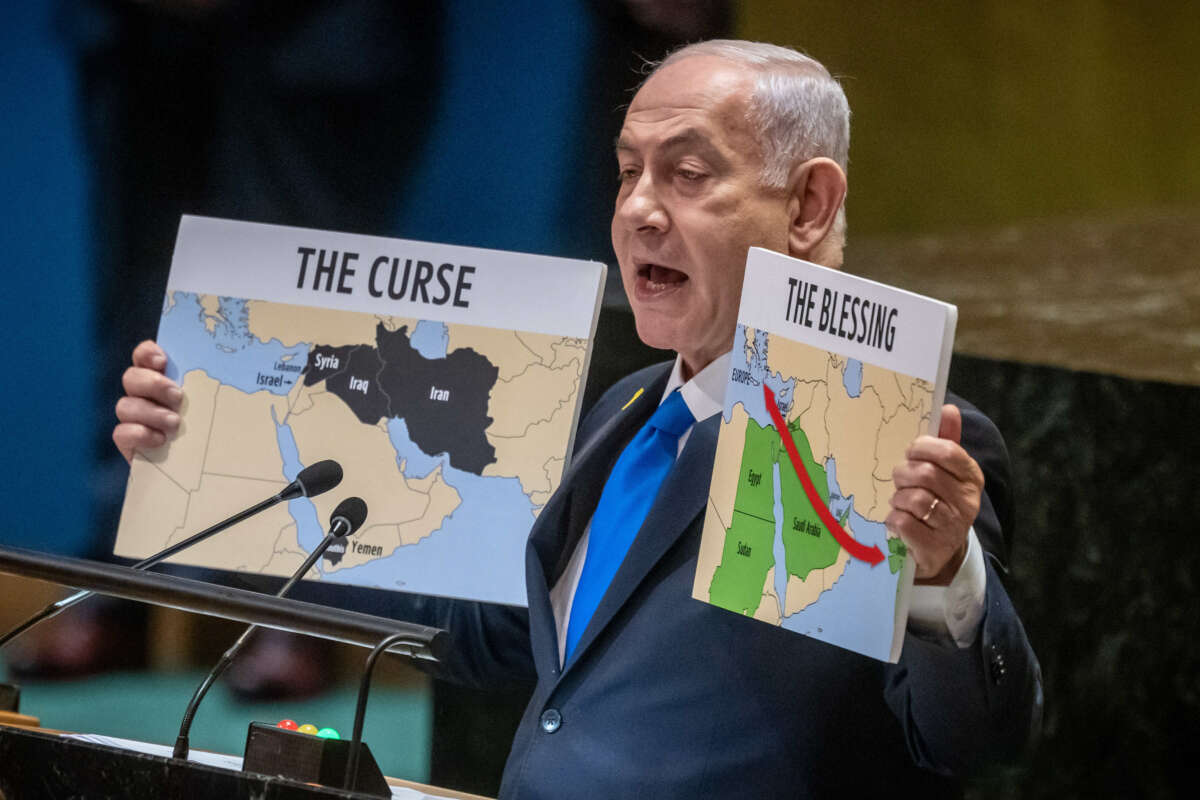Honest, paywall-free news is rare. Please support our boldly independent journalism with a donation of any size.
Former Israeli Prime Minister Ehud Olmert told the British outlet Channel 4 on Monday that he believes current Prime Minister Benjamin Netanyahu wants to drag the U.S. into a war with Iran, an effort that the ex-Israeli leader called “reckless.”
Asked whether he thinks Netanyahu “wants to draw the United States into a confrontation with Iran,” Olmert replied, “I suspect that he does.”
“I think that’s reckless because I’m afraid that if Israel will start a war, a comprehensive war against Iran, and it will expand and Israel will not be in a very comfortable situation, America will join in to help Israel. And that is what Netanyahu believes to be the case,” said Olmert, who served as Israel’s prime minister from 2006 to 2009 and was succeeded by Netanyahu.
Olmert expressed support for Israel’s killing of Hezbollah leader Hassan Nasrallah — a move that prompted Iranian retaliation earlier this month — and said that “something needs to be done” with regard to Iran.
“What needs to be done needs to be done with care, with sensitivity, with responsibility, and with a sense of proportion,” Olmert added. “And I’m not certain that Netanyahu wants this proportion. He looks at the leadership of the international community, the Western world, and he says, ‘Who are they? I’m Bibi Netanyahu.'”
Watch the interview:
Former Israeli Prime Minister Ehud Olmert tells Channel 4 News that he ‘suspects’ Netanyahu wants to draw the US into a confrontation with Iran. pic.twitter.com/crCktsgmEn
— Channel 4 News (@Channel4News) October 8, 2024
Olmert’s remarks came amid growing concern that the U.S.-armed Israeli military could be preparing to bomb Iran’s nuclear energy facilities in response to Iran’s ballistic missile attack last week. The New York Times noted Monday that “there is a rising call inside Israel, echoed by some in the United States, to seize the moment” and strike Iranian nuclear facilities.
Former president Donald Trump, the 2024 GOP nominee, said over the weekend that Israel should “hit the nuclear first and worry about the rest later.”
Speaking to reporters last Thursday, Biden said that the U.S. and Israel are “discussing” a possible attack on Iranian oil infrastructure. The president has said he would oppose an Israeli attack on Iranian nuclear facilities.
Iran has pledged to retaliate against an Israeli attack with a “crushing” blow, heightening fears of a full-blown regional war as Israel continues its devastating assault on Gaza, the West Bank, and Lebanon.
Dylan Williams, vice president for government affairs at the Center for International Policy, said Monday that “President Biden needs to decide if he is finally going to rein in and end his unconditional arming of Netanyahu, or if he will let Netanyahu draw the United States and its forces into war with Iran — a country that is nearly four times the size of Iraq and has twice the population.”
U.S. Vice President Kamala Harris, the Democratic presidential nominee, has done nothing to distance herself from Biden’s unconditional support for Israel despite vocal calls for her to back an arms embargo against the country.
In a closely watched “60 Minutes” interview that aired late Monday, Harris said that “Israel has a right to defend itself” while conceding that “far too many innocent Palestinians have been killed.”
But she did not say she would be willing to use U.S. military aid to Israel as leverage to secure a cease-fire agreement.
Harris also named Iran when asked which country she considers to be the United States’ “greatest adversary” — an answer that CBS did not air as part of its televised broadcast of the “60 Minutes” interview.
Notable answer not included in the 60 minutes broadcast last night (was in Overtime)
— Alex Thompson (@AlexThomp) October 8, 2024
Asked which foreign country she considers to be the US’s “greatest adversary,” Harris says:
“I think there’s an obvious one in mind which is Iran. Iran has American blood on their hands.” pic.twitter.com/yLefXJM1Cr
Harris went on to say that one of her “highest priorities” as president would be to “ensure that Iran never achieves the ability to be a nuclear power.” Asked whether she would take military action in the face of “proof that Iran is building a nuclear weapon,” the vice president responded that she is “not going to talk about hypotheticals.”
Sina Toossi, a senior fellow at the Center for International Policy, called Harris’ answer on Iran “completely out of touch” and said it underscores “the irrational U.S. obsession with Iran, which is driven by politics and donor money, not U.S. interests.”
Last week, a coalition of more than 80 advocacy organizations warned the Biden-Harris administration that “it is not in the national interest for the U.S. to be led into a war with Iran by Benjamin Netanyahu’s government in Israel.”
“It is in the strong national interest to utilize diplomacy, backed by full American leverage — including withholding further offensive weapons transfers to Israel’s military — to move all the parties back from the brink and toward a ceasefire that ends the devastation of Gaza and Lebanon and reverses the slide to regional war,” the groups added.
Press freedom is under attack
As Trump cracks down on political speech, independent media is increasingly necessary.
Truthout produces reporting you won’t see in the mainstream: journalism from the frontlines of global conflict, interviews with grassroots movement leaders, high-quality legal analysis and more.
Our work is possible thanks to reader support. Help Truthout catalyze change and social justice — make a tax-deductible monthly or one-time donation today.
